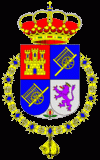Carrión de los Condes (Carrión de los Condes)
 |
It is 40 kilometers from Palencia, on the French Way of the Way of Saint James.
Carrión de los Condes was taken from the Moors by Alonso Carreño around 791–842. Don Carreño took the name Carrión at this time.
Carrión de los Condes was the home of Diego and Fernán González, fictitious sons-in-law of El Cid in the poem El Cantar de Mio Cid (English: The Song of My Cid).
In 1072, after losing the nearby Battle of Golpejera, Alfonso VI of León took refuge in Carrion's Church of Santa María de las Victorias, (or Santa Maria del Camino.) Alfonso ultimately chose exile, where he sought refuge in Toledo, which was then in Moorish hands.
In 1209, Hospital de la Herrada was established by Gonzalo Rodríguez Girón, a Palencia tycoon who became steward of the king, to provide assistance to the Jacobean pilgrims and other travelers. It had considerable influence and power in the area in the 13th and 14th centuries.
Map - Carrión de los Condes (Carrión de los Condes)
Map
Country - Spain
 |
 |
| Flag of Spain | |
Anatomically modern humans first arrived in the Iberian Peninsula around 42,000 years ago. The ancient Iberian and Celtic tribes, along with other pre-Roman peoples, dwelled the territory maintaining contacts with foreign Mediterranean cultures. The Roman conquest and colonization of the peninsula (Hispania) ensued, bringing the Romanization of the population. Receding of Western Roman imperial authority ushered in the migration of different non-Roman peoples from Central and Northern Europe with the Visigoths as the dominant power in the peninsula by the fifth century. In the early eighth century, most of the peninsula was conquered by the Umayyad Caliphate, and during early Islamic rule, Al-Andalus became a dominant peninsular power centered in Córdoba. Several Christian kingdoms emerged in Northern Iberia, chief among them León, Castile, Aragon, Portugal, and Navarre made an intermittent southward military expansion, known as Reconquista, repelling the Islamic rule in Iberia, which culminated with the Christian seizure of the Emirate of Granada in 1492. Jews and Muslims were forced to choose between conversion to Catholicism or expulsion, and eventually the converts were expelled through different royal decrees.
Currency / Language
| ISO | Currency | Symbol | Significant figures |
|---|---|---|---|
| EUR | Euro | € | 2 |
| ISO | Language |
|---|---|
| EU | Basque language |
| CA | Catalan language |
| GL | Galician language |
| OC | Occitan language |
| ES | Spanish language |















